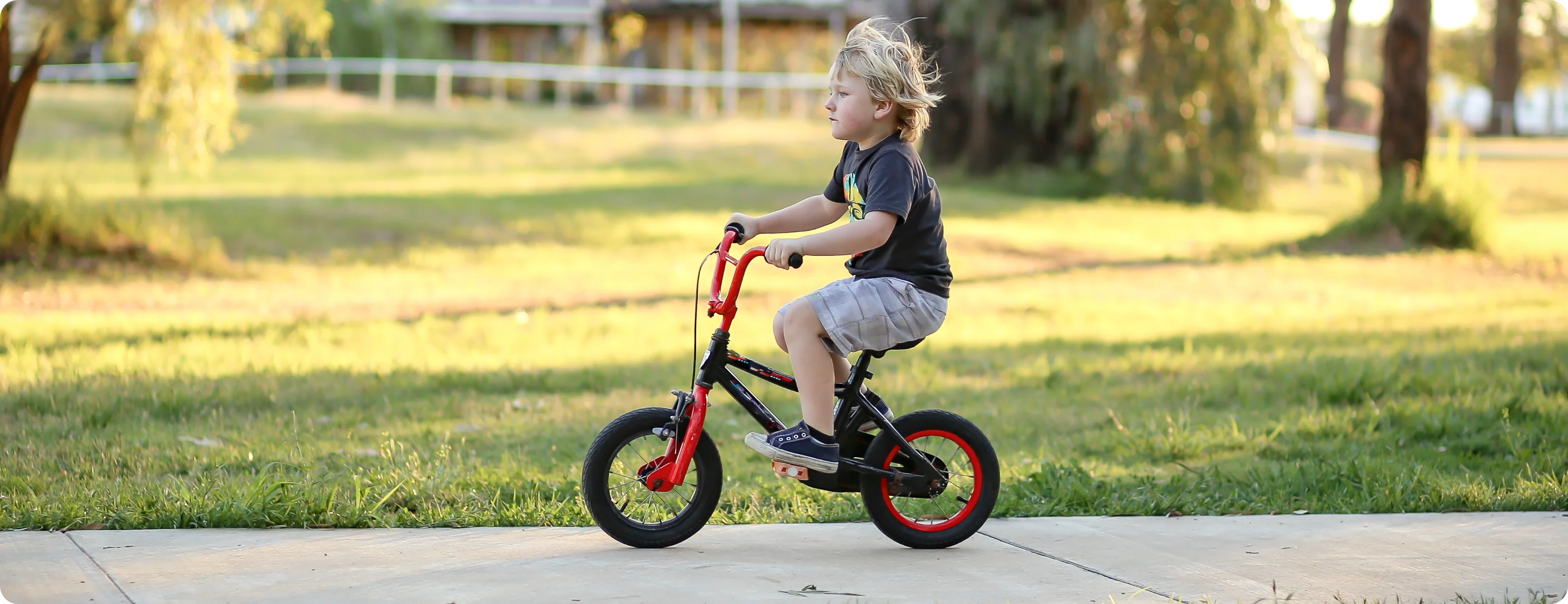Challenge Avoidance: How to Teach Perseverance to Your Child

Stephanie Tsapakis
|
Published on Oct 14, 2021 · 3 min read


Stephanie Tsapakis
|
Published on Oct 14, 2021 · 3 min read

The other day, we were outside playing with our neighbors. My four-year-old loves playing with our neighbor's daughter, who is about six months older. Our neighbor's daughter was learning to ride her bike without training wheels, which sent my daughter into a full-on breakdown about how she also wanted to be able to ride a bike without training wheels.
But, like any irrational tantrum, there was a catch...
"I don't want it to be hard and have to learn, I just want to be able to do it without falling or learning."
Perseverance is defined as continuing to do something regardless of difficulty or lack of immediate success.
This is an attribute that I feel is highly underrated. Perhaps I see it more often, because it is often a strength for students with learning differences. Many of the students I work with have a significant amount of perseverance, and I think it is a hidden gift of having a learning difference.
It is a common complaint about Millennials, they want everything to be easy for them. It causes tension in the professional work environment, and is cited as a character flaw of the generation. (As a Millennial myself, I am here to say this generalization is unfair. However, this reference helps make my point.)
We all know that there are going to be things in life that do not come easily. Being able to tolerate discomfort, normalize frustration, and continue to work at a task is an amazing skill that we are actually able to teach our children.
Recognizing whether or not your child struggles with challenge avoidance is typically not tricky to spot. Parents are usually made well aware, thanks to their child, when perseverance is a struggle. Some common signs may be:
At LD Expert, we watch for these signs in our students, and know that these are often characteristics of children with high intelligence. Many children that struggle with grit are used to things coming easy to them, because they are so smart. Then, when something is a challenge, they are quick to give-up because they are not used to having to struggle.
Overcoming challenge avoidance is a skill that needs to be practices, just like any other new skill. We cannot expect children to pickup and instrument and immediately know how to play, and we cannot expect them to understand how to overcome challenge avoidance.
Additionally, students with learning differences may also struggle with perseverance and grit, because their learning struggles are not always visible to parents or teachers. It is impossible for any of us to understand or measure the amount of effort a child with a learning difference puts into a task. Oftentimes, it takes them a tremendous amount of effort just to keep up in school, and their tolerance for struggle is diminished as a result when it comes to other tasks.
Lawn Mowers... the new Helicopters
I recently heard the term "Lawn Mower Parenting." I immediately fell in love with this term, because it provides a very clear metaphor for the type of parenting that may result in children who are unable to tolerate discomfort.
If you picture walking behind a lawn mover, you can clearly visualize the lawn mower doing the work of cutting down the weeds and clearing a path that is more easily navigated. It is *VERY* tempting to do this as a parent. We do not like to see our children struggle, so we want to go ahead of them and remove any obstacles in their way so that they can experience the positive feelings of success and accomplishment. However, we may actually be doing more damage by giving them the perception that success and accomplishment should come easily, instead of having to work hard for it.
So... what should we do instead?
Just like any other skill, grit and perseverance must be modeled and taught. For some children, it might take extra patience and diligent planning to find the right moments to deliver these lessons. Here are some ways you can teach perseverance to your child:
Another important part of teaching something is to make sure children understand the concept. Teaching your child the definition of perseverance, and having them try to use it in a sentence is a great way for them to feel invested in this more abstract concept.
Think your child might need extra support in this area?
Talk to an ExpertOne really important part of parenting is modeling for our children the lessons we want them to learn. This means that we need to fail, feel frustration, manage difficult emotions, and verbalize our struggles for our children to see.
This could come in many forms. For example, I could have demonstrated for my daughter how her father is pretty good at playing basketball, and I am laughably terrible. This would give her a visual, real-life example of all of the things I tried to explain to her about learning to ride a two-wheeler bike.
Another example of something that is difficult for me is reading in Greek (my husband's native language). My children often get frustrated with me when I try to read them our Greek storybooks, because my reading is slow and labored. Engaging in verbalizations could help model for them how I work through my frustrating emotions and persevere, because I know I will eventually become more fluent after I put in the effort. I could say things like "these words are very hard for me. My brain has to put in extra effort, and it makes my head tired when I have to read them! But I know if I keep practicing, it will get easier, so I will continue to try."
One amazing thing about a child's ability to learn is that they learn by simply watching. If I sit on the couch and read quietly to myself, they can hear my errors. If I then huff and puff, and close the book dramatically, it shows them I'm feeling frustrated. I can then say something to myself like, "It's ok that this is hard. I'm good at working through hard things and I really want to be able to read smoothly in Greek." From there, I pick up the book and try again.
Another great skill to model is walking away. In this example, I can say to myself, "I'm feeling a little too frustrated right now and will come back later after I've had a snack." (As a quick reminder, these are all things I simply say to myself.)
There are sure to be a myriad of things to choose when deciding on how to model perseverance for your children. You could even engage them in choosing the activity, so that they can feel motivated by your continued efforts, and track your progress!
The most important thing to remember when your child is feeling frustrated is to stay calm. Giving a hug, and taking a deep breath while your child is in your arms can do wonders for their nervous system!
One strategy that we use at LD Expert is to stop the activity, and ask students how they are feeling. Next, we ask them to tell us what feels most frustrating, or unclear. It is amazing how often we learn that it is not the activity or subject that children do not like, it is simply the feeling of not understanding. Once we get to the root of the misunderstanding, we can teach skills to overcome it. Thus, in turn, removes the frustration and builds a bank of experiences that a child can look back on and say, “that was hard, I got help, and I did it!”
Every child can learn to push through challenges—with the right guidance. Let’s talk about how we can help.
Talk to UsEncouraging a child when they are frustrated to remember these experiences is very helpful! You may need to let them take a little break or get a snack to calm themselves, then try to return to the task. Emotional resilience comes with practice. The best time to discuss emotional resilience, and the strategies for implementing it next time is when your child is calm. I always find that the time when I am putting my kids to sleep and they are laying in bed is a great time to review the day and things they can try to remember for the next time they come across a challenge.
Positive reinforcement is an integral concept in LD Expert tutoring sessions. While we would love for all children (and adults) to be intrinsically motivated, this is not the reality. Rewards and encouragement go a long way in building grit and perseverance in children.
Even something as simple as verbal praise can make a child feel more confident in their ability to overcome challenges. Try telling your child how proud of them you are, and give explicit examples of how they made you smile. You may be surprised to see their face light up!
It is also important to highlight your pride in your child’s attempts to bounce back and try again. Even if they did not accomplish a goal, or made a mistake, LD Expert always emphasizes these as learning opportunities. Explaining to children that the process of learning involves frustration, challange, and perseverance is integral! Often times, children simply assume that if something is difficult, they are unable to do it. This is exactly the opposite of what we are trying to teach them!
In conclusion, parents can implement all kinds of strategies at home for developing grit and perseverance in their child. It is a value of LD Expert that we also work to instill these skill in our students through our specific evidence-based intervention programs. If you are ready to help your child build perseverance and overcome their academic struggles, schedule a consultation today and learn how we can help support your family.
Looking for personalized support for your child's learning journey?
Our tutoring and dyslexia intervention services are tailored to students with learning differences. Whether it's reading, writing, or other challenges, our team offers one-on-one guidance.
Start with a consultation!Stay updated with our latest blog posts.
Cart